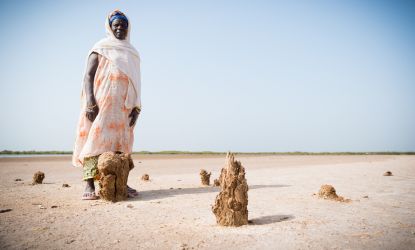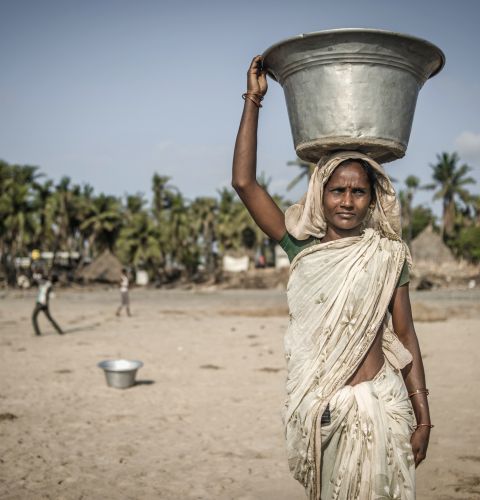Food insecurity is a global issue affecting 820 million people around the world.
Find out about the issue of hunger and food insecurity, how it affects women and girls living in poverty, and what ActionAid is doing to support sustainable food sources for communities.
How does ActionAid work to end hunger?
For decades, the number of people living with hunger had been declining, but the changing climate, entrenched conflict and economic slowdowns are now making hunger worse.
Women and girls are disproportionately affected by hunger. But due to the important roles they play within their communities, they are also crucial actors in the fight against food insecurity.1
That’s why we work with women living in poverty to help them build sustainable, climate-resilient livelihoods, allowing them to support their families and build a future free from hunger.
What does ActionAid do to support sustainable food sources?
We work across some of the world’s poorest countries to help women develop climate-resilient, sustainable livelihoods, with which they can support and feed their families.
Our initiatives include training women women farmers in resilient farming and fishing techniques, including soil conservation, crop diversity, seed banks and water management.
We also support women to access land rights, particularly through ActionAid women’s groups, where women learn about their legal rights and how to assert them.
And we run cooperative farming schemes, supporting women to access livestock, seeds and tools. In these schemes, for everything women sell, they put a percentage back into a communal fund, so all members can access food when they need it.
Did you know? If women had the same access to productive resources as men, they could increase yields on their farms by 20–30%, in turn lifting 100-150 million people out of hunger.5
What is food insecurity?
People experiencing moderate food insecurity have to deal with uncertainties about their ability to access food. They will have, at times, reduced the quality or quantity of their food because they didn’t have the money or resources.
Severe food insecurity, on the other hand, refers to a situation in which people have run out of food, experienced hunger, and/or have gone days without eating. This puts their health and wellbeing at serious risk.
Globally - an estimated 2 billion people are either moderately or severely food insecure.
Why women are worse-affected by hunger around the world
It’s estimated around 60% of the world’s chronically hungry people are women and girls, for many reasons:
- Women are more likely to rely on the land for their food and income, made increasingly difficult by the changing climate.
- Women are less likely to be in decision-making and/or leadership roles, meaning their needs are often overlooked.
- Gender inequality in the distribution of unpaid care work deprives women from opportunities for paid work and education, affecting their food security and nutrition.
- In times of food scarcity, men and boys often get preferential food access, meaning women tend to eat least, and last.

Our Agro-Ecology and Resilience Project has introduced strategies to help women like Bineta adapt to the changing climate in Senegal
Clément Tardif/ActionAid
Hunger relief through climate-resilient farming
Bineta, 72, stands by the remains of a rice store on Baout Island, Senegal.
The island has been experiencing extreme conditions due to climate change, including soil salinisation, erratic rainfall and rising sea levels.
As a result rice cultivation, fishing and shellfish collection have been in decline.
But ActionAid has supported the community with climate-resilient farming methods so that women like Bineta can earn a sustainable living and feed her family.
The Agro-Ecology and Resilience Project is distributing salt- and drought-resistant seeds, and training local women in new farming techniques like table gardening, which allows food to be grown on tables using stored rain water.
Footnotes
- 1http://www.fao.org/state-of-food-security-nutrition/en/
- 2https://www.unwomen.org/en/news/in-focus/commission-on-the-status-of-women-2012/facts-and-figures
- 3https://www.who.int/news-room/detail/15-07-2019-world-hunger-is-still-not-going-down-after-three-years-and-obesity-is-still-growing-un-report
- 4https://www.who.int/news-room/detail/15-07-2019-world-hunger-is-still-not-going-down-after-three-years-and-obesity-is-still-growing-un-report
- 5https://news.un.org/en/story/2011/03/368252-women-could-feed-millions-more-people-if-given-access-means-production-un
Page updated 14 February 2025
